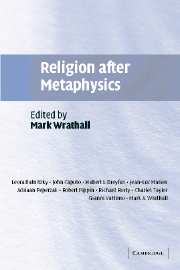Book contents
- Frontmatter
- Contents
- List of contributors
- Preface
- 1 Introduction: metaphysics and onto-theology
- 2 Love and death in Nietzsche
- 3 After onto-theology: philosophy between science and religion
- 4 Anti-clericalism and atheism
- 5 Closed world structures
- 6 Between the earth and the sky: Heidegger on life after the death of God
- 7 Christianity without onto-theology: Kierkegaard's account of the self's movement from despair to bliss
- 8 Religion after onto-theology?
- 9 The experience of God and the axiology of the impossible
- 10 Jewish philosophy after metaphysics
- 11 The “end of metaphysics” as a possibility
- Index
8 - Religion after onto-theology?
Published online by Cambridge University Press: 21 May 2010
- Frontmatter
- Contents
- List of contributors
- Preface
- 1 Introduction: metaphysics and onto-theology
- 2 Love and death in Nietzsche
- 3 After onto-theology: philosophy between science and religion
- 4 Anti-clericalism and atheism
- 5 Closed world structures
- 6 Between the earth and the sky: Heidegger on life after the death of God
- 7 Christianity without onto-theology: Kierkegaard's account of the self's movement from despair to bliss
- 8 Religion after onto-theology?
- 9 The experience of God and the axiology of the impossible
- 10 Jewish philosophy after metaphysics
- 11 The “end of metaphysics” as a possibility
- Index
Summary
“Religion after onto-theology” was the title of a conference held in July 2001. It summarizes the conviction found among “continental” philosophers that onto-theology is outdated, while religion still (or again) has enough meaning to be considered in philosophy. Of the questions such a title triggers, one has puzzled me more than others: To what extent can we declare that ontotheology (or onto-theology or onto-theo-logy) belongs to our past, either in the sense of a definitively closed period, or as a heritage that is still alive and for which there might still be a future? It is the polysemic word “after” that bothers me most, but if we want to discuss it, we should first try to agree on the meaning of “onto-theo-logy.”
Perhaps I am naïve in asking, “What should we mean by onto-theology?” Anyone who has followed the American development of “continental philosophy” should know the group language of its adherents, and not doubt their basic conquests. If this is the right answer to my question, I am afraid that “onto-theology” has become one of those code words that characterize a regional language through which one version of continental philosophy fences off the ignorant – i.e., those who do not agree with the basic tenets proclaimed by the recognized stars. That similar fences are inevitable in all learned discussions might be true (although some philosophers are widely understandable, even to non-professional philosophers); but should we not be alerted when the fence is made of a whole range of key words which by themselves are not clear enough to convey an insight into the news they summarize?
- Type
- Chapter
- Information
- Religion after Metaphysics , pp. 104 - 122Publisher: Cambridge University PressPrint publication year: 2003
- 2
- Cited by



